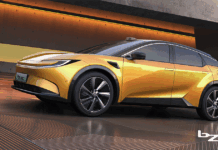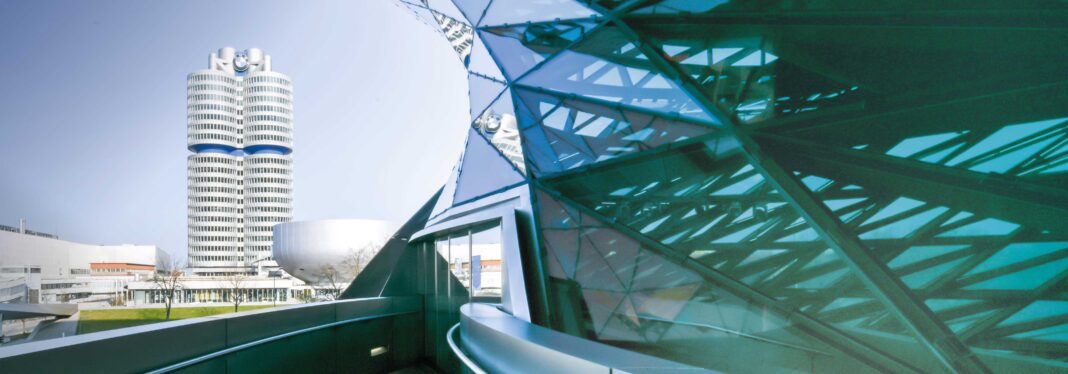
- Zipse: “Our compelling products inspire customers all over the world”
- Group EBT margin at 13.9%
- Automotive EBIT margin climbs to 12.1%
- Free cash flow of around € 2 billion in Auto Segment
- Sales of BMW BEVs up 112%
- 2023 Guidance confirmed in continuing volatility
Munich. With its fresh and attractive portfolio and a
strong product mix, the BMW Group continued on its successful course
in the first quarter of 2023. The company’s strong operating
performance was confirmed by its margins: The Group EBT
margin for the three-month period came in at
13.9%, while the EBIT margin for the
Automotive Segment increased to
12.1%. The BMW Group’s operating financial strength
is also reflected in the free cash flow of €
1,981 million in the Automotive Segment.
With its popular premium vehicles, the BMW Group benefited from
positive development in many automotive markets and from continued
stable pricing for both new and used cars. Sales momentum came from
the electrified product line-up as well as models of higher classes,
which are among the youngest in the market. Sales of BMW BEV
models more than doubled to 55,979
deliveries (2022: 26,362 units/+112.3%).
“The first quarter underlines that compelling products are the best
answer to a persistently challenging environment. Both our electric
vehicles and our renewed model line up with cutting-edge combustion
technology inspire customers all over the world,” said BMW AG
CEO Oliver Zipse in Munich on Thursday. “A high level of
flexibility combined with our operational performance is the basis for
ensuring the BMW Group’s continued success even in the face of headwinds.”
Electrified models drive sales growth
The BMW Group is systematically expanding its range of electrified
vehicles. In the first quarter of 2023, the BEV share of total
deliveries increased to 11.0% (2022:
5.9%/+84.6%), while the figure for electrified models climbed to
19.0%. For the full year 2023, fully-electric
vehicles’ share of total sales should reach 15%.
Overall, deliveries of electrified vehicles (BEV and
PHEV models) rose to 110,486 units in the first
quarter (2022: 89,669 units/+23.2%). The main sales
drivers included the BMW i4* sport coupé and the Plug-in-Hybrid X5*,
but the BMW iX3* and MINI Cooper SE* were also still key contributors.
The fully-electric BMW i7* luxury sedan, the BMW iX1* and the BMW XM*
plug-in hybrid all enjoyed a successful market launch.
Fully-electric models (BEVs) saw particularly strong growth in demand
– with a total of 64,647 units delivered to customers
(2022: 35,289 vehicles/+83.2%). The BMW Group is
expanding its range of electrified models, as planned. The
fully-electric BMW i5 and BMW iX2 will be released onto the market
towards the end of the year. This means the BMW Group will have at
least one fully-electric model of all its main series on the roads in
2023. By 2024, at least one in five of the
company’s new vehicles
should be a BEV; by 2025, it will be
one in four.
The main growth drivers in 2023 will be fully-electric vehicles
(BEVs) and models from the upper premium segment – like the new BMW 7
Series, the BMW XM and the Rolls-Royce model family, as well as the
updated BMW X7 and the BMW X5 M* and X6 M* model updates.
In the upper segment, the BMW Group expects growth
for this financial year to be in the mid-double-digit
percentage range, while BEV models should even see
high double-digit growth. The BMW Group is
projecting a slight increase in global customer deliveries in the
Automotive Segment in 2023.
BMW Group sales benefit from robust demand in automotive markets
In the first quarter of 2023, a total of 588,138
vehicles were sold (2022: 596,907 units/-1.5%). The
BMW brand delivered 517,957
vehicles to customers in the first three months (2022:
519,796 vehicles/-0.4%). BMW M
models, in particular, were again in high demand, with a significant
increase in deliveries of 18.9% to 46,430
units. The main growth driver was the fully-electric
BMW M Performance i4 M50*.
The recently introduced new M3 Touring* is also in very high demand,
as well as the BMW M3 Sedan* and the BMW M4*, which are already well
established on the market. The sales launch of model updates for the
X5 M* and X6 M*, as well as the X5*, X6 M60i* and BMW M2 Coupé*, is
scheduled for the coming months.
Rolls-Royce once again improved on the strong first
quarter of last year, with 1,640 motor cars delivered
to customers (2022: 1,624 vehicles/+1.0%). The
Rolls-Royce Cullinan and Ghost models were the most in demand. The
market introduction of the fully-electric Rolls-Royce Spectre towards
the end of 2023 is set to generate further sales momentum.
The MINI brand reported sales of
68,541 units (2022: 75,487
units/-9.2%). The electrified MINI Cooper SE* and
MINI Countryman Plug-in-Hybrid* models once again increased their
share of total MINI sales, to 19%. The market launch
of the limited MINI Cooper SE Convertible* is another strategic step
towards full electrification of the brand.
Thanks to its balanced global positioning, the BMW Group was able to
take advantage of differentiated sales growth in different regions of
the world during the first quarter. For example, in the Americas and
in the US, it once again posted a significant increase in deliveries.
In the Americas, BMW Group first-quarter deliveries
were up 8.8%, with 107,855 vehicles
sold (2022: 99,169 vehicles). In the US,
90,174 vehicles were delivered to customers (2022:
80,974 units/+11.4%).
In Europe, where the environment was characterised
by persistent inflation and high interest rates, the BMW Group
delivered a total of 216,270 vehicles to customers
(2022: 220,393 units/ -1.9%). Stable new orders and
an order book reaching into the second half of 2023 confirmed the BMW
Group’s strong position in the Europe region in the first quarter.
The aftereffects of the coronavirus pandemic in China dampened the
BMW Group’s business development in Asia in the
three-month period. The company sold a total of 251,927
vehicles (2022: 265,065 vehicles/-5.0%) in
Asia and 195,100 in China (2022:
208,953 vehicles/-6.6%). Sales of electrified models
climbed 79% to 22,390 units.
The upward trend in BMW Group deliveries, which was
clearly visible in March, continued globally in April.
Full consolidation in Q1/2022 affects comparative basis
BBA’s operating profit was included in full and consistently in the
first quarter of 2023, and only from February 11, 2022 in the
prior-year quarter, which should be taken into account when comparing
the previous year. EBIT in the Automotive segment also includes
consolidation effects of varying amounts for 2022 and 2023.
Group revenues increase significantly following BBA full
consolidation in prior-year quarter
First-quarter revenues of BMW Group once again
increased significantly to
€ 36,853 million (2022: €
31,142/+18.3%). This mainly reflected full
integration of the operating business of BMW Brilliance Automotive
Ltd. (BBA) into the Automotive Segment, as well as robust pricing and
a continued positive product mix. Higher material prices and increased
manufacturing costs, due to higher production volumes, raised the
cost of sales compared to the previous year.
Group research and development expenditure totalled
€ 1,554 million (2022:
€ 1,391
million/+11.7%) and were therefore significantly
higher than the previous year. Spending was mainly focused on new
models, as well as further electrification and digitalisation of the line-up.
The R&D ratio
(according to the German Commercial Code) decreased
to 4.2% (2022: 4.5%), due to higher revenues.
Capital expenditure at the BMW Group increased to
€ 1,328 million and was channelled into new models
and structures, with a clear focus on the future topics of
electrification and digitalisation (2022: € 1,098 million/
+20.9%). These investments were financed from
operating cashflow. The capex ratio stood at
3.6% (2022: 3.5%). The company expects the ratio for
the full year to be around 6%.
Lower financial result and Group earnings following full
consolidation of 2022
In the prior-year quarter, one-time effects from the full
consolidation of BBA had substantially boosted BMW Group financial
result and Group earnings. Due to this base effect, both indicators
were significantly lower in the first quarter of 2023. The
financial result for the reporting period was €
-246 million (2022: 8.836 Mio. €), while
Group earnings
before tax (EBT) totalled € 5,129
million (2022: € 12,227 million). The Group EBT
margin for the first quarter of 2023 came in at
13.9% (2022: 39.3%) and Group net profit
amounted to €
3,662 million (2022: €
10,185 million; -64.0%).
Share repurchase: BMW AG holds shares valued at 3.23% of share capital
The BMW Group will conclude the share repurchase
programme with a value of up to € 2.0
billion on the basis of the authorisation granted by the 2022
Annual General Meeting at the latest in mid-2023. A supplementary € 2
billion share buy-back programme will be launched shortly thereafter
and be completed at the latest by 31 December 2025. A strong operating
performance, which results in a strong balance sheet and free cash
flow, are the basis for a continuation of share buyback activities. As
of 31 March 2023, the company holds 21,368,120 treasury
shares, with a nominal value of € 21,368,120. The shares held
represent 3.23%
of the share capital at the time the resolution was passed.
Higher financial figures in Automotive Segment
Revenues rose significantly to € 31,268
million, largely due to full consolidation of BBA (2022: €
26,726 million/ +17.0%). Continued robust pricing for
new and used cars, combined with positive product mix effects also
boosted revenues.
First-quarter earnings before financial result
(EBIT) reached €
3,777 million (2022: € 2,367
million/+59.6%). This strong performance by the
Automotive Segment was confirmed by its EBIT margin
of 12.1% (2022: 8.9%). Without the subsequent effects
of full consolidation of BBA, the EBIT margin was 13.2%.
“We achieved these margins in the face of persistently volatile
conditions. The geopolitical and macroeconomic situation remains
unpredictable and tense. Inflation and interest rates in key markets
are high. The same applies to material and commodity prices. But we
are in a good position: Our strategy is coherent, our attractive
product portfolio is fresh and innovative, and recent challenges have
made us flexible and resilient. This gives us strength and confidence
for the coming months,” said Nicolas Peter, member of
the Board of Management responsible for Finance.
Free cash flow in the Automotive
Segment totalled € 1,981 million (2022:
€ 4,816
million). The seasonal increase in inventory impacted free cash flow
in the first quarter. The BMW Group is targeting a free cash flow in
the Automotive Segment of around € 7 billion for the
full year.
Financial services successful despite intense competition
BMW Group Financial Services’ financing and leasing
business faced considerable competition in the first three months of
the year and was particularly impacted by macroeconomic factors, such
as persistently high interest rates and inflation-related price
increases in many markets. Higher prices in the automotive business
and an improved product mix led to a higher average financing volume
per vehicle in first quarter. The volume of new business with
end customers amounted to €12,788 million
(2022: €14,875 million/-14.0%).
The positive development in the used car markets which led to
continued high revenue from the sale of end-of-lease vehicles, and a
stable risk situation had a positive effect on the segment’s financial performance.
The Financial Services Segment generated earnings before
tax of €
945 million in the first quarter of 2023(2022: €
1,007 million/-6.2%).
The percentage of BMW Group new vehicles leased or
financed by the Financial Services Segment was 36.5%
in the first quarter (2022: 46.8%/-10.3%-points).
Motorcycles Segment increases deliveries and revenues
The Motorcycles Segment posted a new all-time high in the first
quarter of its centenary year: BMW Motorrad delivered
a total of 47,935 motorcycles and scooters, selling
more vehicles in a first quarter than ever before (2022: 47,403 units;
+1.1%). A compelling product line-up, with attractive
new models like the M 1000 R, provides confirmation of the segment’s
successful growth strategy.
This strong operating performance was reflected in significantly
higher financial key figures. Revenues climbed to
€ 933 million (2022: € 799
million/+16.8%). Segment EBIT was up
42.6% to € 154 million (2022: € 108
million) and the EBIT margin increased to
16.5% (2022: 13.5%/ +3%-points).
BMW Group confirms guidance despite high volatility
Despite recessionary trends in many markets, stable development is
forecast for the global automotive market in 2023. In
Europe, slight growth is currently still projected
for the total market, after order books across the region remained at
healthy levels during the first quarter. However, high inflation and
interest rates are creating uncertainty that continues to weigh on
European consumers.
In the US, the robust sales situation should
continue. In China, now that the COVID pandemic has
subsided, the economy and the automotive market are expected to
stabilise over the course of the year, although more intense
competition should also be anticipated.
Bolstered by strong global demand for its attractive premium
vehicles, the BMW Group can confirm its guidance for the
year and is planning for slight growth in
deliveries to customers worldwide in 2023.
The stable pricing situation in the new and used car markets, which
has benefited the BMW Group, is likely to normalise over the course of
the year. More resilient supply chains should improve vehicle
availability – although this could lead to more intense competition.
The BMW Group recognises the uncertainty created by the ongoing
burden of high inflation and interest rates on consumers in many
markets. It also expects manufacturing costs to remain at a high
level, as a result of continuing high prices for industrial metals ‒
especially battery raw materials.
Additional cost headwinds could come from the supply chains and
logistics, as well as from continued high energy prices. Due to
inflation, higher costs for personnel and external services should be
expected over the course of the year.
Taking the above developments into account, the BMW Group forecast
calls for an EBIT margin in the Automotive Segment of
between 8 and 10% for the full year. This still
includes headwinds of € 1.5 billion from consolidation effects which
is around 1% impact in EBIT margin.
A slight increase in deliveries is projected for the
Motorcycles Segment. Its EBIT
margin will remain within the target range of
8 to 10%. Return on equity (RoE) in
the Financial Services Segment is expected to be
between 14 and 17%.
Group earnings before tax will decrease
significantly. These targets will be achieved with slightly
higher employee numbers.
The underlying assumption is that geopolitical and macroeconomic
conditions will not substantially deteriorate. This guidance does not
factor in the possibility of a deep recession in key BMW Group sales
markets or further escalation of the conflict between Russia and
Ukraine, with potential spread of the war.
The BMW Group continues to make targeted investments in the future on
the basis of its current operating performance. During the transition
to emission-free mobility, the BMW Group aims to maintain its
successful course.
|
The BMW Group – an overview |
1st Quarter 2023 |
1st Quarter 2022 |
Change in % |
|
|
Deliveries to customers |
||||
|
Automotive |
units |
588,138 |
596,907 |
-1.5 |
|
thereof: |
units |
517,957 |
519,796 |
-0.4 |
|
MINI |
units |
68,541 |
75,487 |
-9.2 |
|
Rolls-Royce |
units |
1,640 |
1,624 |
1.0 |
|
Motorcycles |
units |
47,935 |
47,403 |
1.1 |
|
|
|
|
||
|
Employees |
149,475 |
118,909 |
25.7 |
|
|
Automotive Segment |
percent |
12.1 |
8.9 |
3.2 %-points |
|
Motorcycles |
percent |
16.5 |
13.5 |
3.0 %-points |
|
EBT margin |
percent |
13.9 |
39.3 |
-64.6 |
|
|
|
|
||
|
Revenues |
€ million |
36,853 |
31,142 |
18.3 |
|
thereof: |
€ million |
31,268 |
26,726 |
17.0 |
|
Motorcycles |
€ million |
933 |
799 |
16.8 |
|
Financial |
€ million |
8,826 |
8,486 |
4.0 |
|
Other |
€ million |
3 |
1 |
– |
|
Eliminations |
€ million |
-4,177 |
-4,870 |
-14.2 |
|
|
|
|
||
|
Profit before financial result (EBIT) |
€ million |
5,375 |
3,391 |
58.5 |
|
thereof: |
€ million |
3,777 |
2,367 |
59.6 |
|
Motorcycles |
€ million |
154 |
108 |
42.6 |
|
Financial |
€ million |
958 |
966 |
-0.8 |
|
Other |
€ million |
-4 |
-32 |
87.5 |
|
Eliminations |
€ million |
490 |
-18 |
– |
|
|
|
|
||
|
Profit before tax (EBT) |
€ million |
5,129 |
12,227 |
-58.1 |
|
thereof: |
€ million |
3,828 |
10,420 |
-63.3 |
|
Motorcycles |
€ million |
154 |
109 |
41.3 |
|
Financial |
€ million |
945 |
1,007 |
-6.2 |
|
Other |
€ million |
-128 |
685 |
– |
|
Eliminations |
€ million |
330 |
6 |
– |
|
|
|
|
||
|
Income taxes |
€ million |
-1,467 |
-2,042 |
28.2 |
|
Net profit |
€ million |
3,662 |
10,185 |
-64.0 |
|
Earnings per share |
€ |
5.31/5.31 |
15.33/15.33 |
-65.4/-65.4 |
1 including joint venture BMW Brilliance Automotive Ltd.,
Shenyang (1 January to 10 February 2022: 96,133 vehicles, 2021:
651,236 vehicles, 2020: 602,247 vehicles, 2019: 538,612 vehicles,
2018: 455,581 vehicles, 2017: 385,705 vehicles).
2 Ratio of Group earnings before taxes to Group revenues
GLOSSARY – explanatory comments on key performance indicators
BEV: Battery Electric Vehicle
Deliveries to customers
A new or used vehicle is recorded as a delivery once its handed over
to the end user (which also includes leaseholders under lease
contracts with BMW Financial Services). In the US and Canada, end
users also include (1) dealers when they designate a vehicle as a
service loaner or demonstrator vehicle and (2) dealers and other third
parties when they purchase a company vehicle at auction and dealers
when they purchase company vehicles directly from the BMW Group.
Deliveries may be made by BMW AG, one of its international
subsidiaries, a BMW Group retail outlet, or independent third-party
dealers. The vast majority of deliveries – and hence the reporting of
deliveries to the BMW Group – is made by independent third-party
dealers. Retail vehicle deliveries during a given reporting period do
not correlate directly to the revenues that the BMW Group recognises
in respect of that particular reporting period.
EBIT
Profit before financial result. Profit before financial result
comprises revenues less cost of sales, less selling and administrative
expenses and plus/minus net other operating income and expenses.
EBIT margin
Profit/loss before financial result as a percentage of revenues.
EBT
EBIT plus financial result.
PHEV: Plug-in-hybrid electric vehicle
RoCE
Return on capital employed (RoCE). RoCE in the Automotive and
Motorcycles segments is measured on the basis of relevant segment
profit before financial result and the average amount of capital
employed – at the end of the last five quarters – in the segment
concerned. Capital employed corresponds to the sum of all current and
non-current operational assets, less liabilities that generally do not
incur interest.
RoE
Return on equity (RoE). RoE in the Financial Services segment is
calculated as segment profit before taxes, divided by the average
amount of equity capital – at the end of the last five quarters –
attributable to the Financial Services segment.
If you have any questions, please contact:
BMW Group Corporate Communications
Dr Britta Ullrich, Finance Communications
Telephone: +49 89 382-18364
Email: britta.ullrich@bmwgroup.com
Eckhard Wannieck, head of Communications BMW Group, Finance, Sales
Telephone: +49 89 382-24544
Email: eckhard.wannieck@bmwgroup.com
Media website: www.press.bmwgroup.com/deutschland
Email: presse@bmwgroup.com
The BMW Group
With its four brands BMW, MINI, Rolls-Royce and BMW Motorrad, the BMW
Group is the world’s leading premium manufacturer of automobiles and
motorcycles and also provides premium financial and mobility services.
The BMW Group production network comprises over 30 production sites
worldwide; the company has a global sales network in more than 140 countries.
In 2022, the BMW Group sold nearly 2.4 million passenger vehicles and
more than 202,000 motorcycles worldwide. The profit before tax in the
financial year 2022 was € 23.5 billion on revenues amounting to
€ 142.6 billion. As of 31 December 2022, the BMW Group had a workforce
of 149,475 employees.
The success of the BMW Group has always been based on long-term
thinking and responsible action. The company set the course for the
future at an early stage and consistently makes sustainability and
efficient resource management central to its strategic direction, from
the supply chain through production to the end of the use phase of all products.
www.bmwgroup.com
Facebook: http://www.facebook.com/BMWGroup
Twitter: http://twitter.com/BMWGroup
YouTube: http://www.youtube.com/BMWGroupView
Instagram: https://www.instagram.com/bmwgroup
LinkedIn: https://www.linkedin.com/company/bmw-group/
*Fuel consumption/emissions data:
BMW i4 eDrive35: Power consumption in kWh/100 km: –
(NEDC)/18.7-15.8 (WLTP); electric range (WLTP) in km: 406-483
BMW X5 xDrive40i: Power consumption combined in
kWh/100 km: – (NEFZ) / 9,9–8,5 (WLTP); CO2 emissions combined in g/km:
– (NEFZ) / 224–193 (WLTP)
BMW iX3: Power consumption combined in kWh/100 km: –
(NEDC)/18.9-18.5 (WLTP); electric range (WLTP) in km: 453-461
MINI Cooper SE: Electric range (WLTP combined): 201
km; power consumption (WLTP combined): 17.2 kWh/100 km; power
consumption combined (NEDC) in: – kWh/100 km
BMW i7 xDrive60: Power consumption in kWh/100 km
combined: 19.6-18.4 WLTP
BMW iX1 xDrive30: Power consumption in kWh/100 km: –
(NEDC)/18.1-16.9 (WLTP); electric range (WLTP) in km: 417-439
BMW XM: Fuel consumption weighted, combined in l/100
km: – (NEDC)/1.6-1.4 (WLTP); CO2 emissions weighted, combined in g/km:
– (NEDC)/36-32 (WLTP); power consumption weighted, combined in kWh/100
km: – (NEDC)/301-28.6 (WLTP); electric range (WLTP) in km: 82-90
BMW X5 M Competition: Power consumption combined in
kWh/100 km: – (NEFZ) / 13,1–12,9 (WLTP); CO2 emissions combined in
g/km: – (NEFZ) / 295–291 (WLTP)
BMW X6 M Competition: Power consumption combined in
kWh/100 km: – (NEFZ) / 12,9–12,7 (WLTP); CO2-Emissionen CO2 emissions
combined in g/km: – (NEFZ) / 292–287 (WLTP)
BMW i4 M50: Power consumption in kWh/100 km: –
(NEDC)/22.5-18.1 (WLTP); electric range (WLTP) in km: 414-520
BMW M3 Competition Touring mit M xDrive: Power
consumption combined in kWh/100 km: – (NEFZ) / 10,4–10,1 (WLTP); CO2
emissions combined in g/km: – (NEFZ) / 235–229 (WLTP)
BMW M3 Limousine: Power consumption combined in
kWh/100 km: – (NEFZ) / 10,1–10,0 (WLTP); CO2 emissions combined in
g/km: – (NEFZ) / 231–227 (WLTP)
BMW M4 Competition Coupé: Power consumption combined
in kWh/100 km: – (NEFZ) / 9,8 CO2 emissions combined in g/km: – (NEFZ)
/ 224–223 (WLTP)
BMW X5 M60i xDrive: Fuel consumption combined in
l/100 km: – (NEDC)/12.5-11.5 (WLTP); CO2 emissions combined in g/km: –
(NEDC)/283-261 (WLTP)
BMW X6 M60i xDrive: Fuel consumption combined in
l/100 km: – (NEDC)/12.3-11.4 (WLTP); CO2 emissions combined in g/km: –
(NEDC)/279-258 (WLTP)
BMW M2 Coupé: Power consumption combined in kWh/100
km: – (NEFZ) / 10,2–9,6 (WLTP); CO2 emissions combined in g/km: –
(NEFZ) / 231–218 (WLTP)
MINI Cooper SE Countryman ALL4: Fuel consumption in
l/100 km: 2.1-1.9 (NEDC), 2.1-1.7 (WLTP); power consumption in kWh/100
km combined: 14.8-14.1 (NEDC), 15.9-14.8 (WLTP); CO2 emissions in g/km
combined: 48-44 (NEDC), 47-39 (WLTP)















